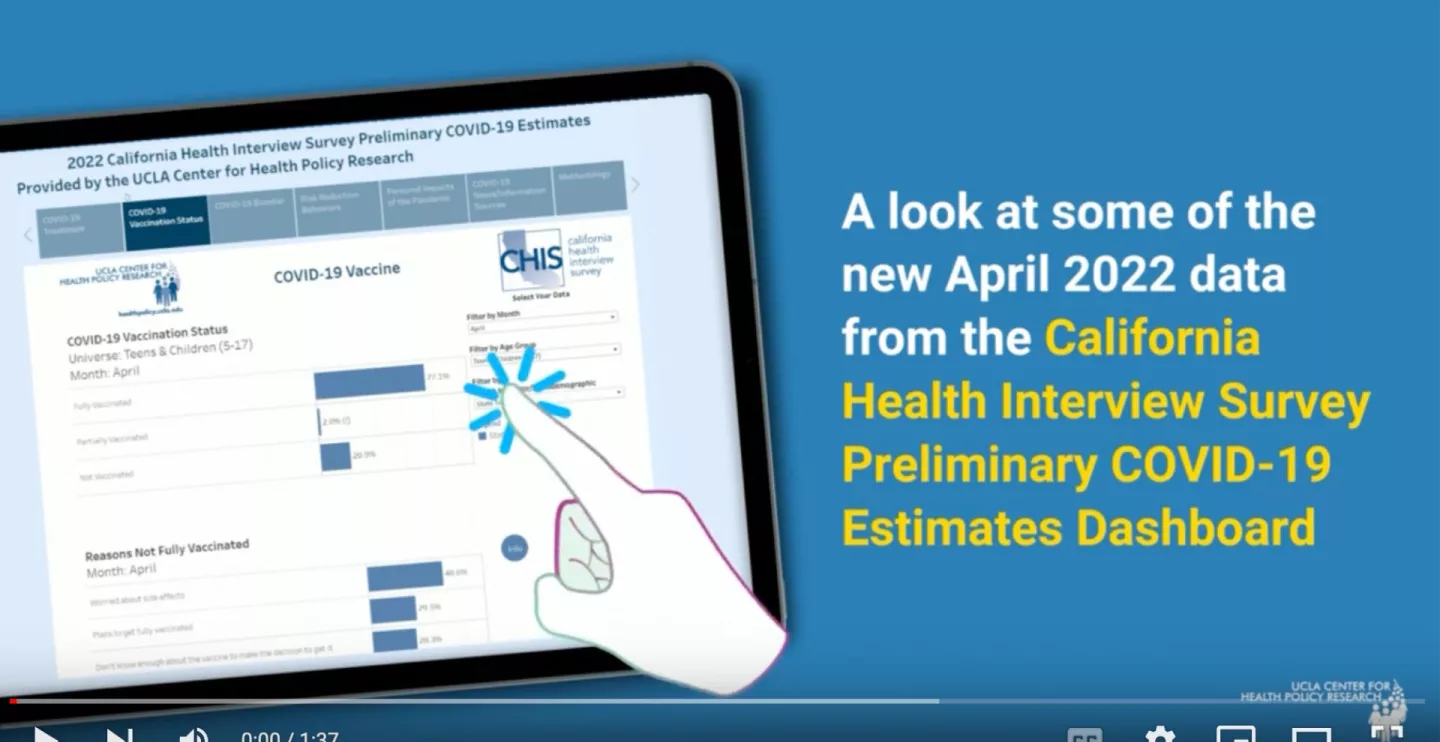New UCLA survey estimates show unvaccinated adults least likely to wear a mask, engage in risk reduction behaviors
New data from April 2022 show high rates of teen and child vaccination, long COVID, and more
Media Contact:
UCLA CHPR Communications Team
COVID-19 spurred lockdowns and mask mandates more than two years ago. However, data released today from the UCLA Center for Health Policy Research’s California Health Interview Survey (CHIS) show Californians were still taking precautions, such as wearing masks and avoiding large gatherings, in April 2022. About 2 in 5 (39%) California adults said they always wore a mask when leaving their home in the past week, 20% said usually, 24% said sometimes, and 16% said they never wore a mask. Unvaccinated adults were less likely to mask up, with more than 1 in 4 (26%) unvaccinated adults saying they never wore a mask, compared to 1 in 7 (14%) fully vaccinated adults.
The latest update to the 2022 CHIS COVID-19 Preliminary Estimates Dashboard, which adds responses from 3,317 Californians in April 2022, builds on previously released data collected in February and March this year. In addition to risk reduction behaviors, topics include Californians’ experiences with long-lasting COVID-19 symptoms, reasons for not receiving the vaccine or booster shots, personal and financial impacts of the pandemic, and COVID-19 news and information sources.
The April 2022 dashboard also features brand new data on vaccination rates among children and teenagers. More than 3 in 4 (77%) children and teenagers were fully vaccinated, according to a sample of 423 teens and children across the state.
“As COVID-19 began spreading across the state in spring 2020, the California Health Interview Survey jumped into action, collecting critical data on Californians’ experiences with COVID-19, including positivity rates, views on vaccine, personal and financial impacts of the pandemic, and conflict during stay-at-home orders,” says Todd Hughes, CHIS director. “Two years later, we are continuing to add new COVID question to CHIS to provide decisionmakers with the data needed to help their communities.”
Additional findings include:
Views on Vaccines and Boosters
More than half (52%) of California adults who were not fully vaccinated said they were worried about side effects, 37% felt the vaccine was developed too quickly, 27% said they don’t know enough about the vaccine, 27% said the vaccine is unnecessary, and 21% said they don’t believe in vaccines in general.
More than 3 in 4 (77%) California teens and children were fully vaccinated. Among those were not fully vaccinated, nearly half (49%) were worried about side effects, 30% had plans to get fully vaccinated, and 28% said they don’t know enough about the vaccine to make a decision to get it.
More than half (56%) of adults who are fully vaccinated had received a booster, 27% were very likely to receive a booster, 10% somewhat likely, 3% not very likely, and 3% not at all likely.
Among adults who are not fully vaccinated or who are fully vaccinated but unlikely to receive the booster, nearly three-quarters (73%) cited the booster being unnecessary as the reason they wouldn’t get it.
COVID-19 Testing
More than 1 in 5 (22%) California adults said they have never taken a COVID-19 test.
California adults living in Los Angeles County (82%), the Greater Bay Area (82%), and the Central Coast (80%) were significantly more likely to have taken a COVID-19 test compared to adults living in the Northern/Sierra Counties (58%).
Long COVID
More than 1 in 3 (35%) California adults had long-lasting COVID-19 symptoms.
1 in 2 (51%) Black or African American Californians and more than 2 in 5 (44%) Latinx Californians had long-lasting symptoms.
Risk Reduction Behaviors
White adults were less likely to always wear a mask (24%), compared to most other races and ethnicities: Black or African American (60%), Asian (55%), and Latinx (47%).
Naturalized citizens (62%) and non-citizens (58%) were more likely to always wear a mask than U.S.-born citizens (30%).
Unvaccinated adults were more than twice as likely as vaccinated adults to say they never followed state and local guidelines when gathering with people not living in their household: 26% vs. 10%.
Nearly 9 in 10 (88%) California adults said they did not participate in large gatherings with more than 1,000 attendees (indoors) or 10,000 attendees (outdoors) in the past 30 days.
Personal Impacts of the Pandemic
1 in 10 (10%) California adults lost their job due to layoffs, business closures, or market changes; Latinx adults were more than twice as likely as white adults to report losing their jobs: 14% vs. 6%.
Lower-income adults were more likely to lose their job due to layoffs, business closures, or market change: 14% of adults at 0%–99% of the federal poverty level (FPL) and 21% at 100%–199% FPL, compared to 6% at 300% FPL and above.
Latinx adults were 4 times more likely than white adults to experience financial difficulties with basic necessities, such as paying bills, tuition, affording groceries, etc.: 20% vs. 5%. Latinx adults were also more likely than white adults to experience financial difficulties with paying rent or mortgage: 18% vs. 5%.
Source of COVID-19 News and Information
1 in 3 (34%) adults said they got their COVID information from television and nearly 1 in 5 (17%) said social media. Only 11% said government agencies and 4% said doctors.
Age played a factor in how Californians get their COVID information. More than half of adults 65 years and older (55%) said television, compared to 28% of adults 18–64 years old; 1 in 5 adults 18–64 years old (21%) cited social media as their top COVID information source. Notably, adults 18–64 years old were more likely to cite government agencies than those 65 years and older: 13% vs. 6%, respectively.
Note: The California Health Interview Survey Preliminary COVID-19 Estimates Dashboard can be filtered by a range of sociodemographic factors such as age, race/ethnicity, income, and educational attainment, as well as other health indicators and risk factors.
#
About the UCLA Center for Health Policy Research
The UCLA Center for Health Policy Research (CHPR) is one of the nation’s leading health policy research centers and the premier source of health policy information for California. UCLA CHPR improves the public’s health through high quality, objective, and evidence-based research and data that informs effective policymaking. UCLA CHPR is the home of the California Health Interview Survey (CHIS) and is part of the UCLA Fielding School of Public Health.














